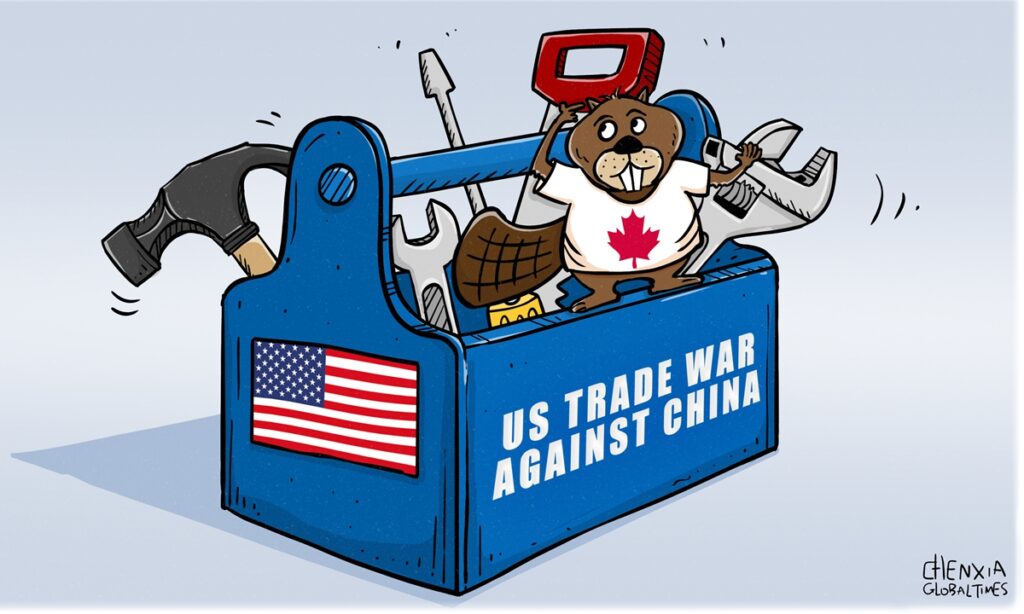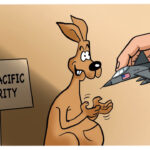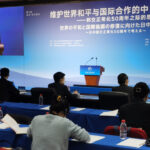With Ottawa increasingly showing its intention of adopting an anti-China stance in lockstep with the US, it is not surprising to see growing anti-China sentiment among Canadian public opinion, threatening bilateral economic and trade cooperation that could otherwise help the Canadian economy fend off risks ahead, including a likely US slowdown.
In a Nanos Research Group survey for Bloomberg News conducted in late November, 61 percent of respondents said Canada should reduce its trade with China, a 16-point increase compared with December 2020, Bloomberg reported on Wednesday.
While it is unclear how representative these voices are across the broader Canadian society, it is still regrettable to see some in Canada hoping to cut economic ties with its second-largest trading partner. If anything, this will become a major source of frustration for Canadian businesses looking for opportunities in China, especially at a time when Canadian exports show signs of slowdown.
Indeed, Canadian public opinion’s turning against trade with China has formed a sharp contrast with the actual performance of China-Canada economic and trade cooperation. The inconsistency, to a certain extent, reflects that some in the Canadian society have been misled and fooled by some politicians’ radical attitude toward China.
For instance, the same Bloomberg report referenced data released Tuesday showing that Canadian exports to China reached a record monthly high of C$3.3 billion ($2.4 billion).
According to statistics published by China’s General Administration of Customs on Wednesday, in the first 11 months of 2022, Chinese imports from Canada in dollar-denominated terms surged 34.2 percent year-on-year, the second-highest growth rate in China’s trade with all trading partners and second only to Russia.
Canada’s contradictions over trade with China is a result of the anti-China rhetoric pushed by some Canadian officials on various occasions. Despite the influence from Washington, it is still hard to understand why some politicians blindly follow the US, with no regard for their country’s national interests. For instance, in late October, Canada’s Industry Minister Francois-Philippe Champagne publicly declared that his country wants a “decoupling” from the world’s second-largest economy.
At a time when even the US cannot pursue a complete “decoupling” from China, it is ridiculous to see some Canadian politicians talk about “decoupling” or reducing trade with China and pivoting toward so-called “democratic allies” in Asia, as if China was not important and it was easy to strengthen trade with other Asian countries.
Yet, what these politicians decline to tell the public is that there has been little progress in expanding or “friend-shoring” economic and trade cooperation between Canada and other Asian countries.
In fact, even in the country’s so-called Indo-Pacific Strategy released on November 27, which is full of malice and prejudice against China, Canada itself admitted that “China’s sheer size and influence makes cooperation necessary to address some of the world’s existential pressures, such as climate change and biodiversity loss, global health and nuclear proliferation. And China’s economy offers significant opportunities for Canadian exporters.”
Some may argue that Canada is more dependent on the US economy, but this should by no means be an excuse for Canada to give up its independent foreign policy and choose to become a cannon fodder for the US geopolitical game.
Moreover, since the US economy is currently in a downturn, the Canadian economy’s over reliance on the US is not good news. Data released on Tuesday showed that in US dollars, Canada’s overall exports were down 1.3 percent in October. Under such circumstances, trade with China could be an opportunity for Canada to ease its own economic pressure.
But it is Canadian policymakers who are standing in the way of grasping the opportunity. Instead, they rather follow the US and mislead the public for political expediency, which ultimately will lead to severe damage on Canada’s national interests.
Indeed, tough talks about China may get some politicians short-term popularity in Canada, as is the case in some other Western countries given the toxic level of anti-China sentiment hyped by the politicians themselves. But as costs inevitably rise for their businesses and consumers, many Western politicians find themselves in an awkward position of having to warm up to China again. This has been the case for a growing number of Western countries, we don’t see how Canada will be the exception.




